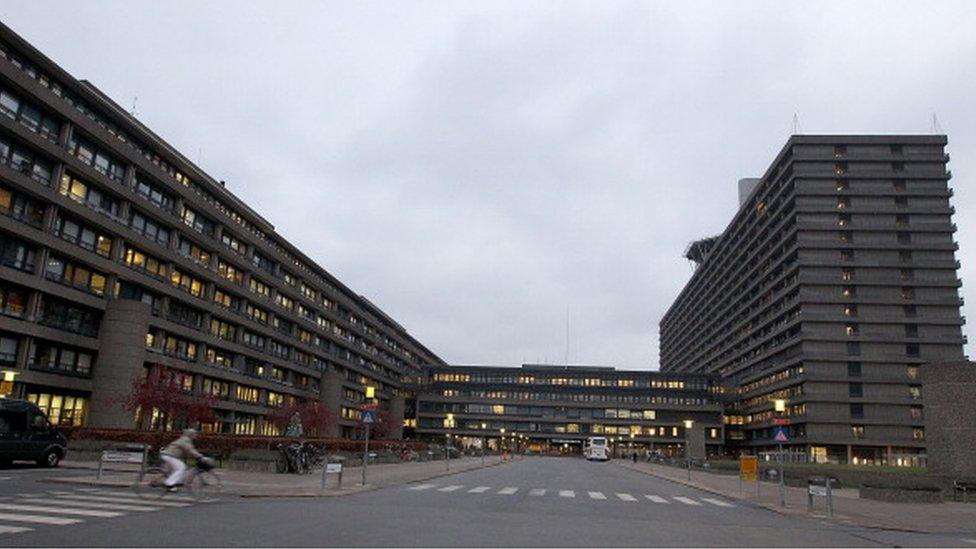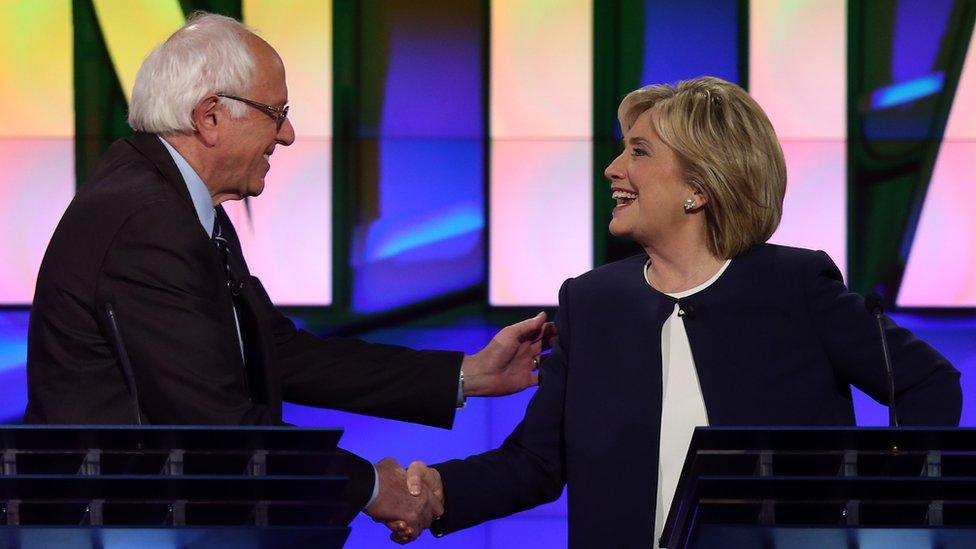Democratic debate: How do Denmark and the US differ?
- Published

Democratic presidential candidate Bernie Sanders has said we "should look to countries like Denmark... and learn from what they have accomplished for their working people". So how different are the US and Denmark?
This isn't the first time Mr Sanders, who describes himself as a democratic socialist, has expressed admiration for Denmark's social model - he has previously said, external it "provides extraordinary security and opportunity".
His rival in the race for the White House, Hillary Clinton, responded by saying she loved Denmark but "we are the United States".
So what does that difference look like?

Who gets healthcare?

The Danish health care system is more cost-effective than that of the US
Mr Sanders is glowing in his depiction of Denmark's healthcare system - "universal, free of charge and high quality".
In the US there are still millions of people without health insurance. In 2012, it was 15.4 % of the population but that figure has now fallen to below 10% due to President Barack Obama's healthcare reforms.
The Danish health care system is also more cost-effective, as Mr Sanders has noted. Figures provided by the World Bank for 2013, external put the amount Denmark and the US spend on healthcare at at 10.6% and 17.1% of GDP respectively.
American journalist Justin Cremer, who has lived in Denmark for five years, has two children, one born in the US and the second in Denmark. He says that while the US hospital provided a far more comfortable experience, he and his wife later faced "the nightmare of working out what was covered by my insurance and what was covered by my wife's insurance".
And Mr Cremer points out that hospital care they had in the US was only available to them because "we had decent jobs that provided insurance".

Free cooks for new mothers?

Denmark's parental leave is considered "among the most generous and flexible" by the EU
As an example of one of the "myths" around Denmark's social system that Danish journalist Kristoffer Kraen recalls encountering in the US, he gives the example of an academic who asked him whether it was true that whenever a woman in Denmark gives birth, a social worker is dispatched to cook and clean for her.
Alas, not even Denmark's support for new parents is this extensive but nevertheless, its policy on parental leave is described by the EU, external as "among the most generous and flexible" in the union.
Mothers in Denmark are entitled to four weeks of paid maternity leave before the expected date of birth and 14 weeks afterwards. Fathers are entitled to two weeks of leave within the first 14 weeks after the birth, with each parent entitled to 32 weeks of parental leave.
In the US, only employers with 50 members of staff or more are required to offer 12 weeks of unpaid leave.


Helle Thorning Schmidt is perhaps best known outside Denmark for her selfie with David Cameron and Barack Obama at Nelson Mandela's memorial service
Watch out for the glass ceiling
Another facet of Denmark's politics sure to meet the approval of Mr Sanders is the high participation of women in politics.
Helle Thorning Schmidt became Denmark's first female prime minister in 2011. The leaders of the other two parties in her coalition government were also women.
Meanwhile, one study, external of representation of women in national legislatures carried out in 2013 put the US 95th out of 184 countries, 12 places behind Saudi Arabia. (The Danes came in at a respectable 13th place, of course).
However, highlighting the US's lack of progress in this regard would be awkward for Mr Sanders, as his main rival for the nomination is making her second attempt to become the first female presidential candidate for either major party.

Can't we all just get along?

Bernie Sanders and Hillary Clinton had some moments of agreement during Tuesday's debate
In contrast to the adversarial nature of the US presidential system, with power alternating between one of only two big parties, Danish politics has a reputation for being more consensual.
Voters in Denmark had at the last election no fewer than 10 parties to choose from, and it's not only in Danish TV dramas that smaller parties can end up with influence in government.
Bernie Sanders has recognised that the relative size of the two countries is an important difference - and that does of course impact on their respective political systems. Denmark just has the one government, whereas any radical moves from a Sanders administration would have to make it past Congress and 50 powerful state governments.
In any case, the Danish set-up seems to be more popular with voters - at the last election in June this year, Denmark had a turnout of 85.8%, well above the 58.2% of those eligible to vote who did so in the 2012 US presidential election. Or perhaps trudging to the polls is just part of that Danish sense of collective duty.


Wish you were here
One area that Mr Sanders hasn't highlighted in his praise of Denmark is its policy on immigration. "If he wanted to move to Denmark, he might find it quite difficult," Mr Cremer points out.
Even though the current presidential debate in the US has generated its own fair share of anti-foreigner rhetoric - with Republican presidential hopeful Donald Trump pledging to deport illegal immigrants and Syrian refugees - the idea of newcomers "becoming American" is readily accepted in the US.
By contrast, Mr Kraen says that Danes have had difficulty adapting to changes in their previously homogenous population and that some Danes "can have trouble welcoming people that don't look like ourselves".
He says this has gone hand in hand with a questioning of the Danish model of social welfare more generally, with immigrants perceived by some as being "more expensive" in terms of welfare provision - even though their contribution to the economy in other ways has sometimes gone ignored.